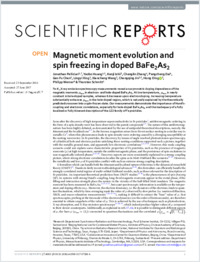Magnetic moment evolution and spin freezing in doped BaFe 2 As 2
- Pelliciari, Jonathan Research Department Synchrotron Radiation and Nanotechnology, Paul Scherrer Institut, Villigen PSI,Switzerland - Department of Physics, Massachusetts Institute of Technology, Cambridge, USA
- Huang, Yaobo Research Department Synchrotron Radiation and Nanotechnology, Paul Scherrer Institut, Villigen PSI,Switzerland - Beijing National Lab for Condensed Matter Physics, Institute of Physics, Beijing, China
- Ishii, Kenji Synchrotron Radiation Research Center, National Institutes for Quantum and Radiological Technology, Hyogo, Japan
- Zhang, Chenglin Department of Physics and Astronomy, Rice University, Houston, USA
- Dai, Pengcheng Department of Physics and Astronomy, Rice University, Houston, USA
- Chen, Gen Fu Beijing National Lab for Condensed Matter Physics, Institute of Physics, Beijing, China
- Xing, Lingyi Beijing National Lab for Condensed Matter Physics, Institute of Physics, Beijing, China
- Wang, Xiancheng Beijing National Lab for Condensed Matter Physics, Institute of Physics, Beijing, China
- Jin, Changqing Beijing National Lab for Condensed Matter Physics, Institute of Physics, Beijing, China - Collaborative Innovation Center for Quantum Matters, Beijing, China
- Ding, Hong Beijing National Lab for Condensed Matter Physics, Institute of Physics, Beijing, China
- Werner, Philipp Department of Physics, University of Fribourg, Switzerland
- Schmitt, Thorsten Research Department Synchrotron Radiation and Nanotechnology, Paul Scherrer Institut, Villigen PSI,Switzerland
-
14.08.2017
Published in:
- Scientific Reports. - 2017, vol. 7, no. 1, p. 8003
English
Fe-K β X-ray emission spectroscopy measurements reveal an asymmetric doping dependence of the magnetic moments μbare in electron- and hole-doped BaFe2As2. At low temperature, μbare is nearly constant in hole-doped samples, whereas it decreases upon electron doping. Increasing temperature substantially enhances μbare in the hole-doped region, which is naturally explained by the theoretically predicted crossover into a spin-frozen state. Our measurements demonstrate the importance of Hund’s-coupling and electronic correlations, especially for hole-doped BaFe2As2, and the inadequacy of a fully localized or fully itinerant description of the 122 family of Fe pnictides.
- Faculty
- Faculté des sciences et de médecine
- Department
- Département de Physique
- Language
-
- English
- Classification
- Physics
- License
- License undefined
- Identifiers
-
- RERO DOC 305780
- DOI 10.1038/s41598-017-07286-6
- Persistent URL
- https://folia.unifr.ch/unifr/documents/306082
Statistics
Document views: 63
File downloads:
- wer_mme.pdf: 109
